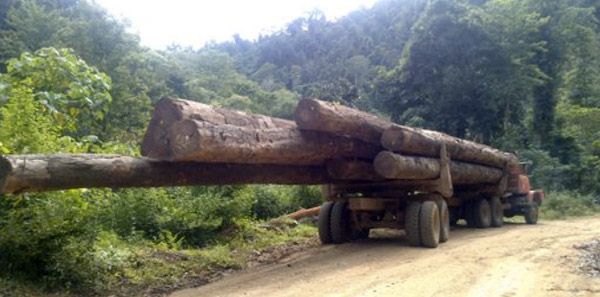Editor’s note: updated at 11:55 EDT on 6/12/14 with response from Wilmar.

Logs being transported on a road was built by PT Sawindo Cemerlang. The photo was taken in the months after Wilmar’s announcement of its No Deforestation Policy. Courtesy of Greenomics.
Two palm oil companies partially owned by Wilmar are continuing to destroy rainforests in Indonesia despite a high profile zero deforestation pledge, alleges a new report published by Greenomics.
The report, titled As a strategic shareholder, is this in line with Wilmar’s No Deforestation Policy?, looks at recent activities by PT Sawindo Cemerlang and PT Sawit Tiara Nusa, companies owned by the Kencana Agri Group Ltd. Wilmar holds a 20 percent stake in Kencana Agri, according to financial filings.
Analyzing satellite data, Greenomics found that both PT Sawindo Cemerlang and PT Sawit Tiara Nusa are clearing forests in Pohuwato Regency, located in Gorontalo, North Sulawesi. Independent data from Global Forest Watch confirms recent changes in forest cover in the area.

Recent deforestation alerts from WRI’s Global Forest Watch.
While the forest clearing isn’t illegal, Greenomics says Ministry of Forestry data shows that the area consists almost entirely of selectively logged forests, which under Wilmar’s December 2013 zero deforestation policy are considered high carbon stock areas. Therefore the activity would seem to represent a breach of Wilmar’s policy.
“Wilmar’s No Deforestation Policy states that it applies to ‘all Wilmar’s operations worldwide, including those of its subsidiaries, any refinery, mill or plantation that we own, manage, or invest in, regardless of stake’,” states the report. “Consequently, Wilmar urgently needs to explain what exactly is going on at these two palm oil concessions.”
“Has a HCS assessment ever been carried out on the two companies?,” asked Elfian Effendi, the Executive Director of Greenomics.

These Landsat satellite images show the clearance of HCS forests in the two palm oil concessions subsequent to 5 December 2013, the date on which Wilmar announced its No Deforestation Policy. It is clear that from 7 December 2013 until at least 14 April 2014, the two palm oil companies continued to clear HCS forests, as if Wilmar’s No Deforestation Policy was entirely irrelevant. Caption and image courtesy of Greenomics.
Greenomics added that the situation raises questions about how Wilmar is monitoring affiliates and whether it will continue to source palm oil from suppliers who accelerate forest clearing ahead of its deadline for ending deforestation.
“Wilmar needs to explain its plans for those of its associates and suppliers whose permits are new or relatively new and whose concessions are dominated by HCS forests,” said the group. “Wilmar needs to explain the trend of accelerated clearance of forested areas, especially HCS forests, by its associates and suppliers ahead of the “deforestation deadline” of 31 December 2015.”
In response to the report, Wilmar said it would investigate the matter.
“We are looking into the allegations seriously and we are currently engaging Kencana but will need more time to work out the next steps,” Wilmar told Mongabay.com via email. “We reiterate our commitment to our “No Deforestation, No Peat and No Exploitation’ policy.”
Wilmar is the world’s largest palm oil company, trading or producing nearly half the world’s palm oil. Under pressure from environmentalists and buyers for sourcing palm oil associated with deforestation and social conflict, Wilmar last year announced a far-reaching policy that set social and environmental safeguards across its global supply chains. The policy applies to commodities it produces and buys, while committing the company to work with stakeholders to reduce conflict.
Wilmar’s pledge has raised hopes that palm oil could eventually become a deforestation-free product. In recent decades, the highly profitable crop has driven large-scale forest destruction across Indonesia and Malaysia, putting endangered species like orangutans at increased risk and boosting greenhouse gas emissions.
Citation: Greenomics. As a strategic shareholder, is this in line with Wilmar’s No Deforestation Policy? June 2014.
Note: the original version of this story stated that Wilmar’s HCS definition is based on 35 tons of carbon per hectare threshold. In fact, Wilmar has adopted a “strata” approach to protecting forests, with forests 10 years old and above considered HCS. Thanks to Glenn H. for the correction.
Related articles
Zero-deforestation commitments pose acute challenges for commercial giants in the palm oil industry

(05/22/2014) The path to zero-deforestation appears to be paved with good intentions, but how successful are these companies in staying on that path? A controversial proposal to construct a refinery in the wildlife-rich Balikpapan Bay in Indonesian Borneo highlights the challenges faced by both palm oil companies and conservationists in the face of zero-deforestation commitments.
Will zero deforestation commitments save Indonesia’s forests?

(03/17/2014) Skirting the Malacca Strait near the Indonesian city of Dumai the air is thick with haze from peat fires burning below. As the sky clears, a landscape of sharply-cut geometric shapes becomes apparent. What was once carbon-dense peat forests and rainforests are today massive oil palm and wood pulp plantations.
World’s biggest palm oil company makes zero deforestation commitment

(12/05/2013) Wilmar, the world’s largest palm oil trader and a long-time target of environmentalists, has signed a landmark policy that commits the company to eliminate deforestation from its supply chain. The deal, if fully implemented, has the potential to transform the palm oil industry, which has emerged over the past decade as one of the world’s most important drivers of tropical forest destruction.














